Lockdown is finally giving us an opportunity to work our way through the huge collection of vintage board games that we have put together over the last few years. It genuinely is a thrill to look through the collection and work out what we now have time to play. Careers has been sat there for an age, yet it’s a game that I have heard so much about over the years. Everyone that plays it seems to be full of praise for it.
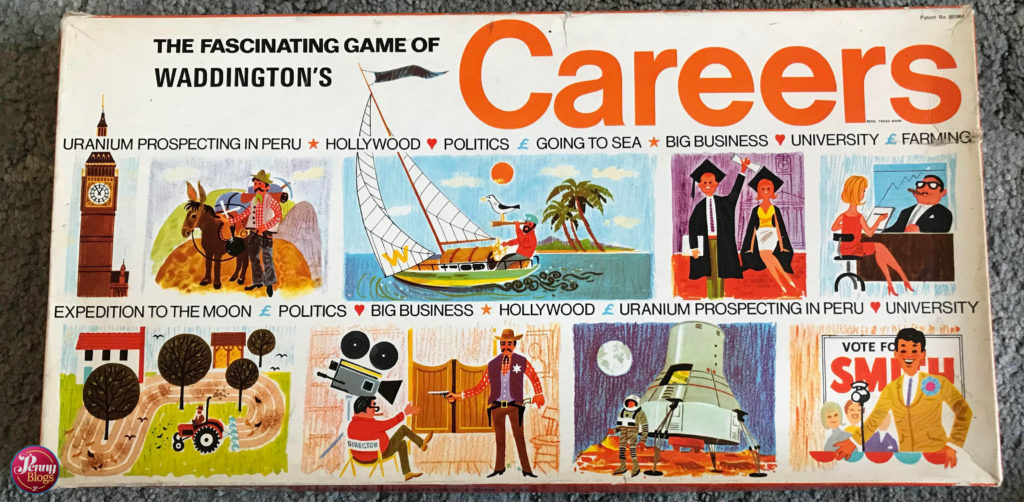
Trying not to be limited by just the people we’re locked down with, we’ve also been experimenting at playing games online with friends situated elsewhere in the country using Skype, a couple of cameras and a bit of pre-planning. So far they’ve been quite successful (and they will be covered in other blog posts just as soon as I get chance!) but they have been games that we’ve already known. Venturing out into vintage games that none of us have played before is a new (and exciting) challenge.
History of Careers
Careers really is quite an old board game. First published by Parker in 1955 in the US, it has seen numerous different versions over the years and some modernisation, which hasn’t necessarily always been welcome. More on that later.
The game was invented by James Cooke Brown, a fascinating man who did far more than “just” invent a board game – there’s a wonderful write up about him over on the History Girls blog here by someone that has done a huge amount of research on the man and his other achievements.
How to win at Careers
One unique feature of Careers is that is each player sets their own “success formula” which is basically what they need to do to win the game. Made up of three components (money, fame and happiness) each player has to decide which is most important to them and create an equation taking into account all three. Your success formula has to add up to 60 points, (each £1,000 in money is a point) but the weighting between money, fame and happiness is completely up to the player. It certainly takes away that idea that the person with the most money is the best.
What is particularly interesting in Careers is that you don’t share your success formula with anyone until you have achieved it. So players don’t know what their opposition is working towards, or how close anyone may be to winning the game. It’s an intriguing twist.
Playing the game
In terms of actually playing the game, the board has a track to work around round the edge of the board, which represents a year of a player’s life. Leading off the main track are eight “career” paths which players can choose to follow if they land on the relevant start square, or may be forced to follow if they have received an instruction to do so from a card or other square on the board.
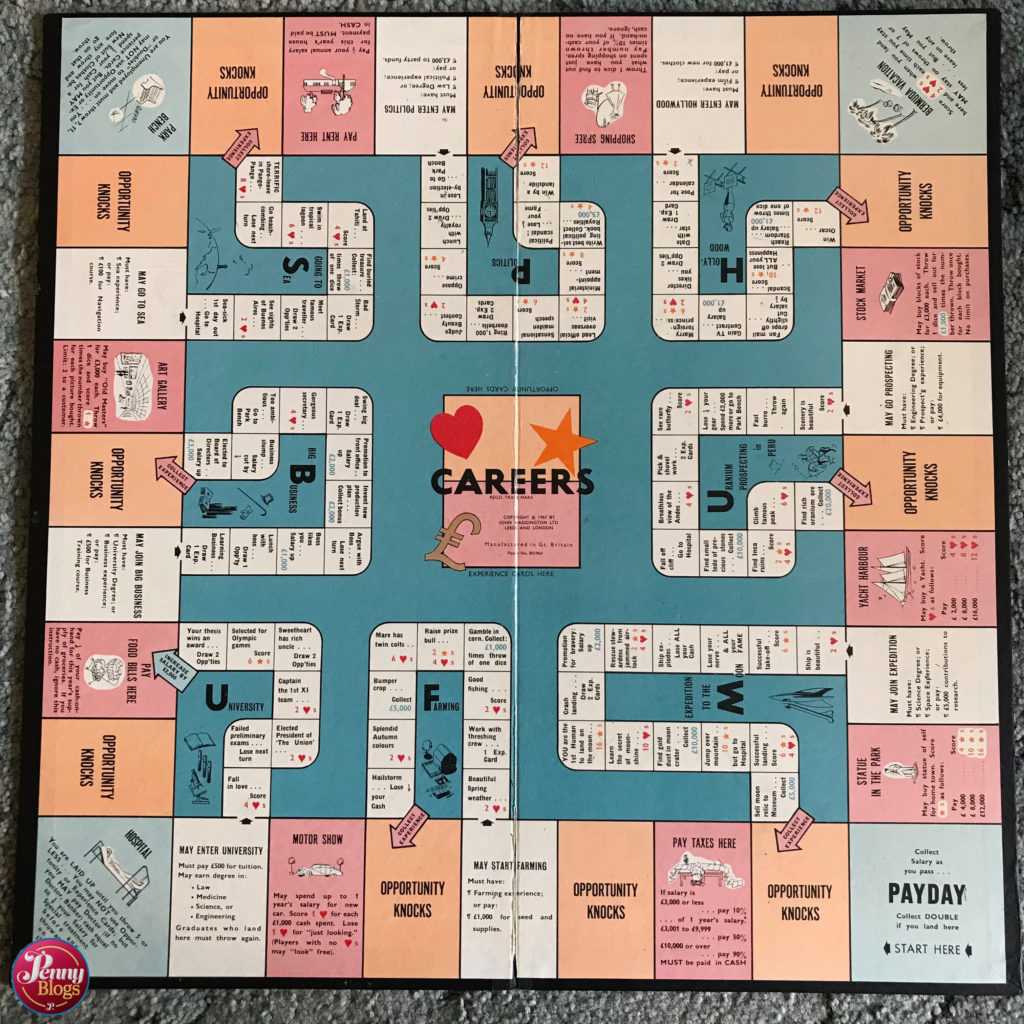
The original version of the game had a total of 8 careers paths:
- Uranium prospecting in Peru
- Hollywood
- Politics
- Going to Sea
- Big Business
- Expedition to the Moon
- Farming
- University
In some later versions of the game I understand that Uranium Prospecting was replaced by a career in Computing, Going to Sea became setting sail on a Yacht and Farming morphed into Ecology. I also understand that there was a girl’s version of the game released at some point that has “being a Super Mom” as a career path on it! I shall refrain from commenting further on that particular version of the game…
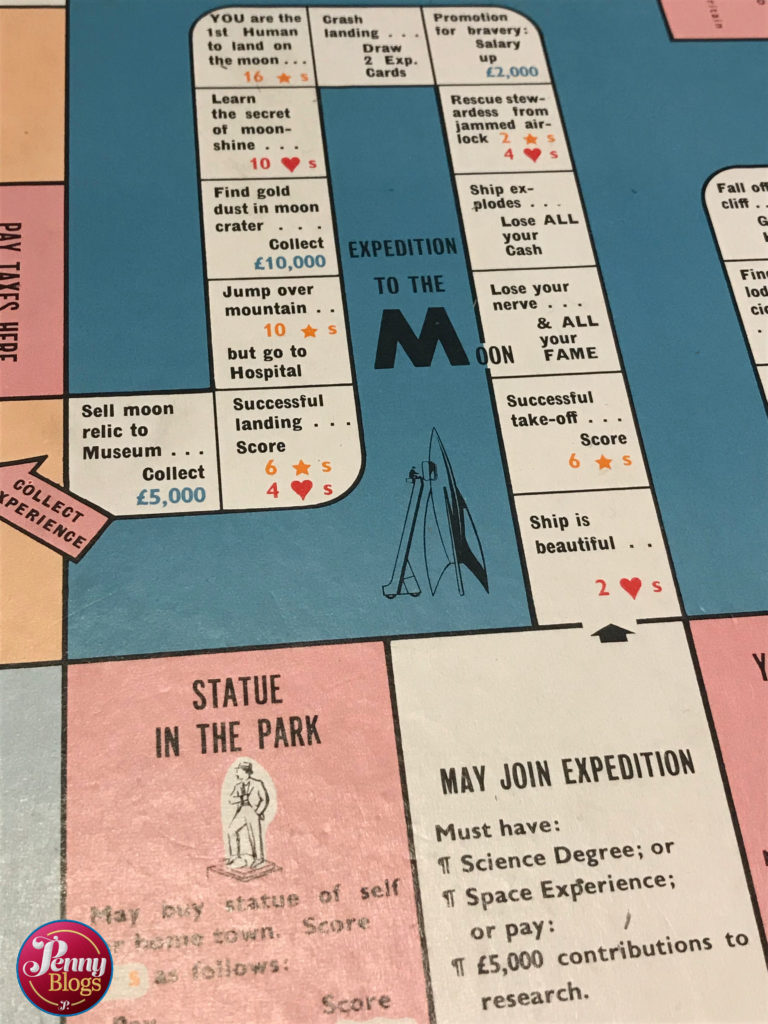
As you go round the various careers paths (which you do by throwing a single die instead of the usual two) there is opportunity to gain fame and happiness points, appropriate to the different careers themselves. In the current situation, I guess I find it a bit strange that one of the careers isn’t medicine, yet one of the University degrees that players can obtain is medicine and the player that therefore becomes the Doctor in the game collects payments from other players when they go into hospital, and they also themselves receive free hospital treatment.
Players are allowed to go to University once in the game and when they have completed their university education they receive a degree and a £2,000 salary increase.
Opportunity and Experience Cards
As you go around the board players have the opportunity to pick up both opportunity and experience cards. The yellow opportunity cards are used to move to the entrance squares of the various careers on the board. The interesting thing is that they don’t have to be used immediately. It can be held until you want to use it, or even sold to another player.
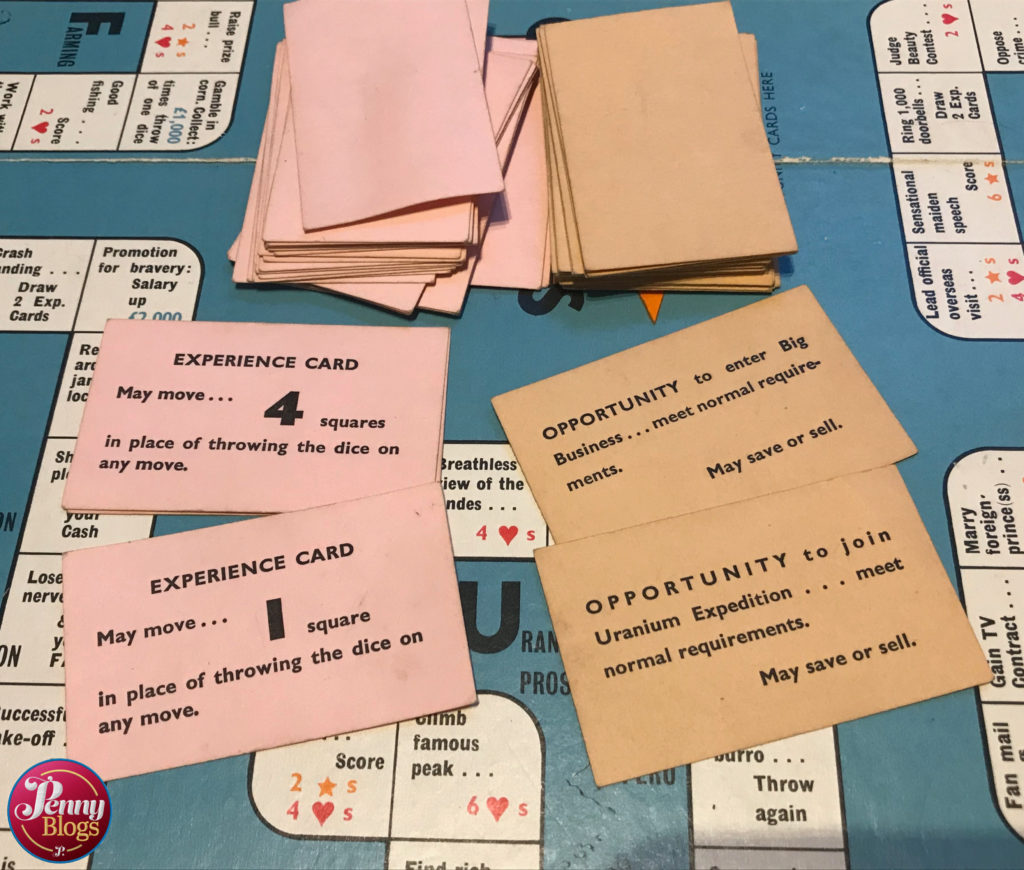
Pink experience cards actually can not be used on the same turn on play on which they are drawn. They are “premiums” for your career experience and can help players plan when to enter various careers. They can be used at any other time in the game though, instead of a usual roll of the dice. They can also be bought and sold between players.
Player score sheets
A key part of the game of careers is that players have to record quite a lot of information about their journey around the board themselves. At the start of the game players write down their success formula, but as they go they also note down their experiences and happiness and fame points. A record is also made of their salary level and their university education.
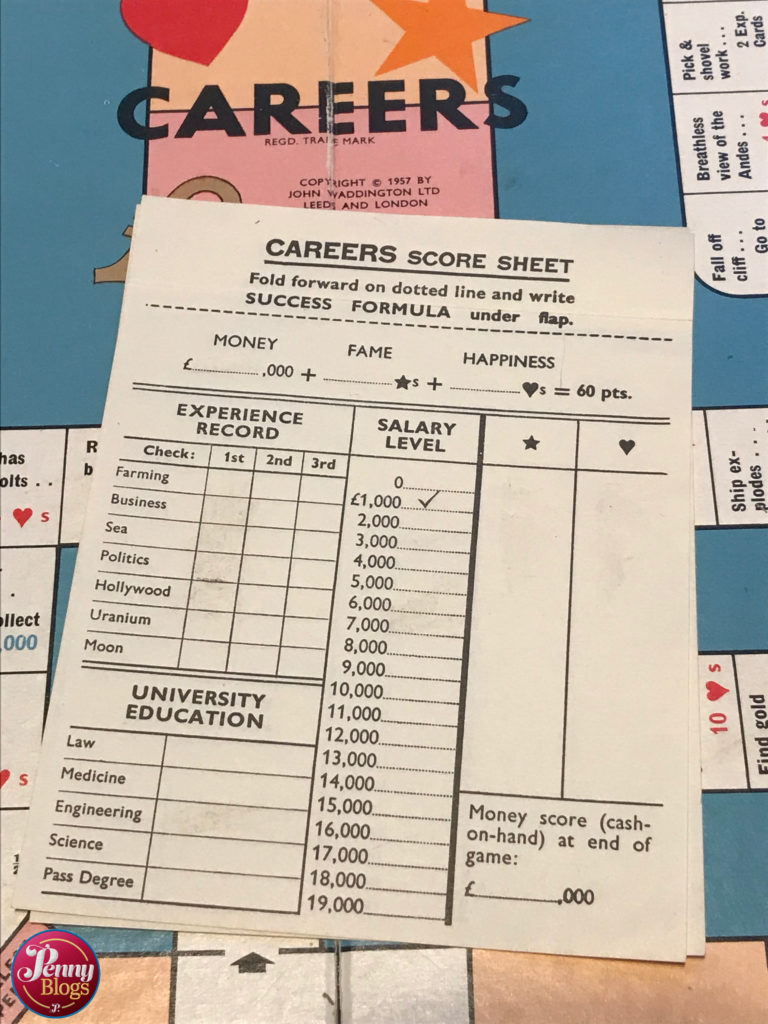
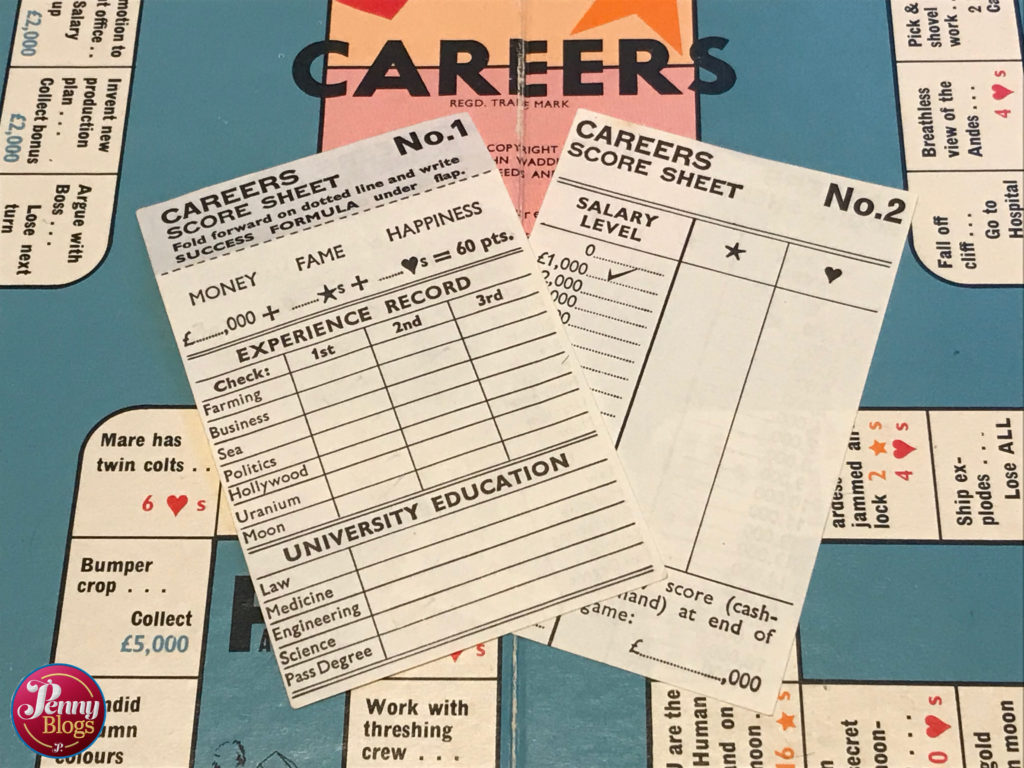
Interestingly, out of two vintage versions of the game that I have one has everything on one score sheet (a Waddingtons 1956 small box version) yet 1969 “long box” Waddingtons version has two separate Score Sheets (No 1 and No 2). I’ve no idea why and if anything think it slightly over complicates things.
Corner Squares
The corner squares on the Careers board are also worth a separate mention. The Payday square is pretty self explanatory, with players collecting their annual salary as they pass, or if they are lucky enough to land on the square they get double their salary.
For players who land on the Hospital square they are required to stay there until they throw 5 or less. Whilst there they may not use Opportunity or Experience cards. However, if they want a quick release from hospital there is the possibility of paying the Doctor half your annual salary to leave early.
Players who end up unemployed go to the Park Bench. Again they can not use Opportunity or Experience cards. but throwing 7, 11 or a double allows them to move on. For the cost of half of their cash players can also buy a new suit and move on in a chosen turn.
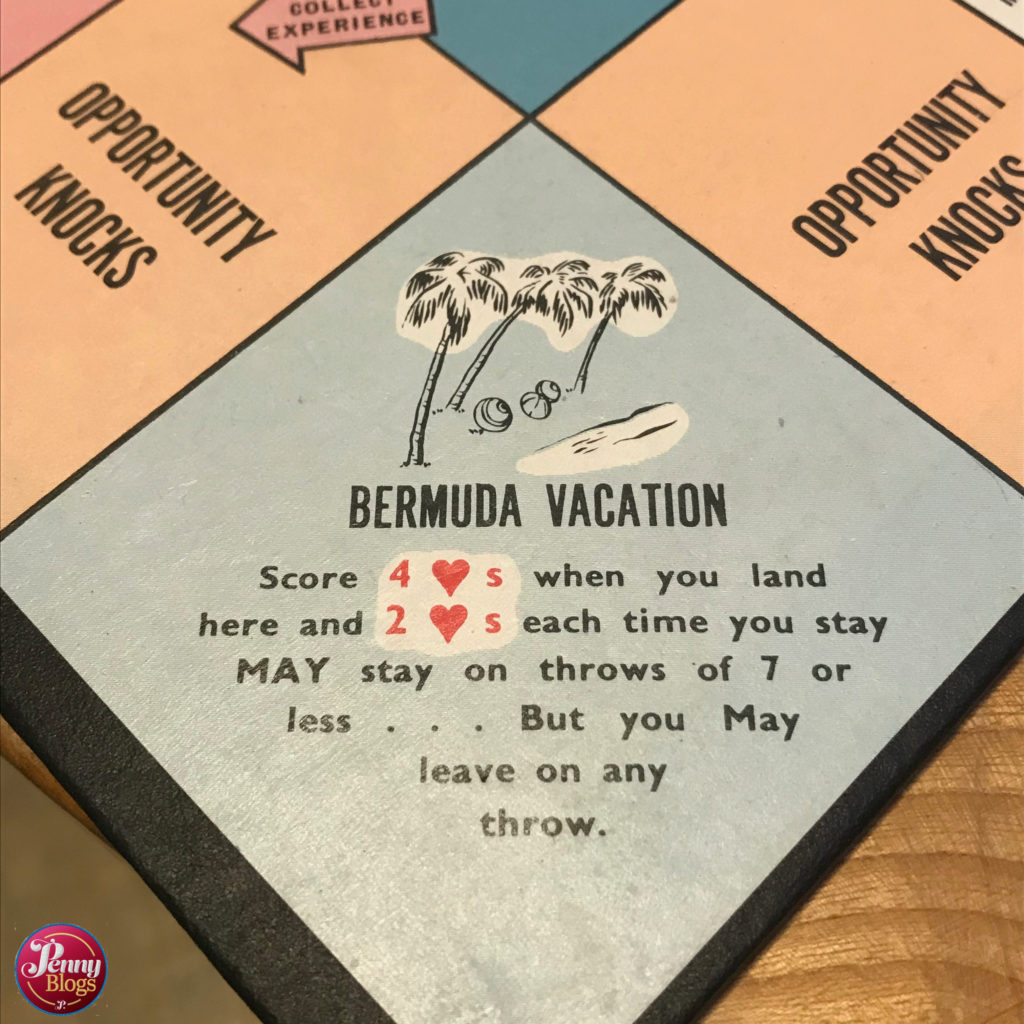
To help players with their happiness levels there is also the option of a Bermuda Vacation. Four happiness points are awarded to players who land on this particular corner square and players may also choose to stay there is they roll 7 or less whilst there. But, no one if forced to stay on holiday!
End of the game
With all players having their own success formula and no one knowing what other players are working towards it is difficult to say in advance as to when the game will end, or exactly how.
When a player meets his or her success formula then they simply declare so and are the winner.
I’m told that once everyone playing is familiar with the game it can be easier to know which careers give you what your need for your success criteria and to chase after them. That doesn’t mean that the rolls of the dice will always co-operate with you though!
What we thought of that game
In just a couple of words, we absolutely loved it!
Play is relatively simple, and possible a little dull if I’m honest, for the first couple of times around the board, but once players start on the different career paths the game picks up pace somewhat. The fact that no one knows what the other players have to do to win is a strike of genius. It means that you have no idea if you should be rushing to do something as the others are hot on your tail, or if actually you’re miles out in front. And the other players are no wiser than you.
I think we also all liked how quaint and old fashioned the career paths were. When the game was first issued no one had been to the Moon, so the Mission to the Moon career path must have seemed quite futuristic. The paths for Politics, Big Business and University similarly are very of their time and as for Uranium Prospecting in Peru, well…
Different versions of Careers
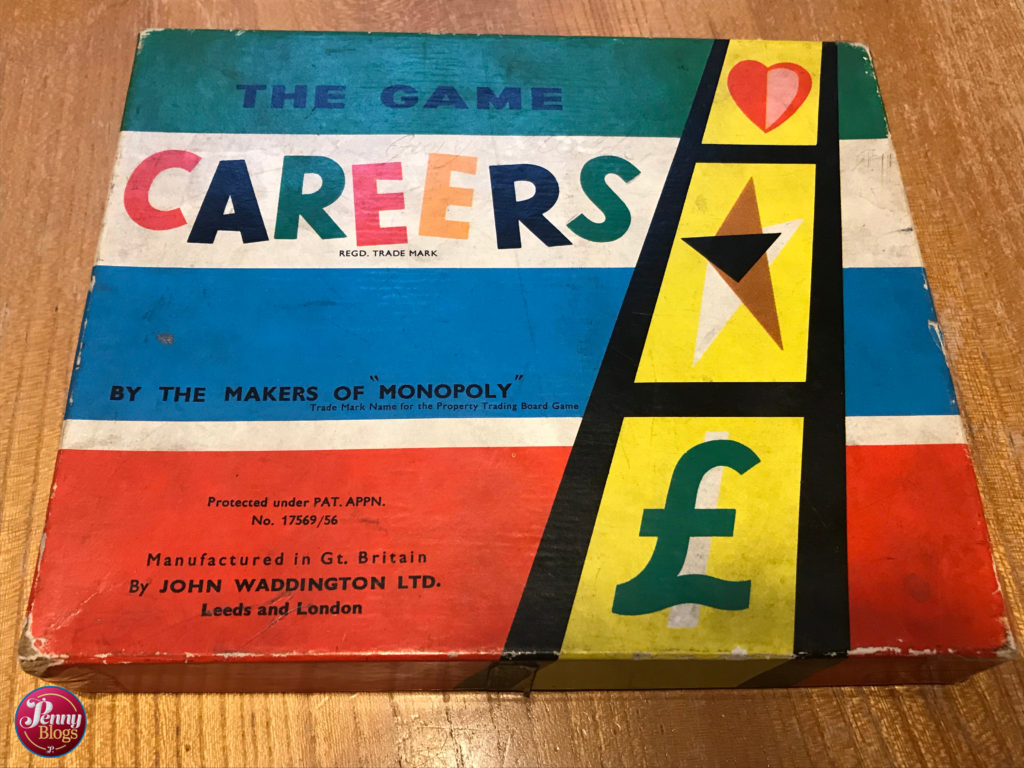
Although there isn’t a modern day version of Careers in production right now, there have been various different versions over the years. It was originally produced by Parker Brothers and at other points came under the Waddingtons name. The latest version was published by Winning Moves, yet I’ve also managed to get my hands on a copy that Jumbo produced in 1998. I’m yet to find a record of this version online, but it does look very similar to a Dutch version that Jumbo released in 1998.
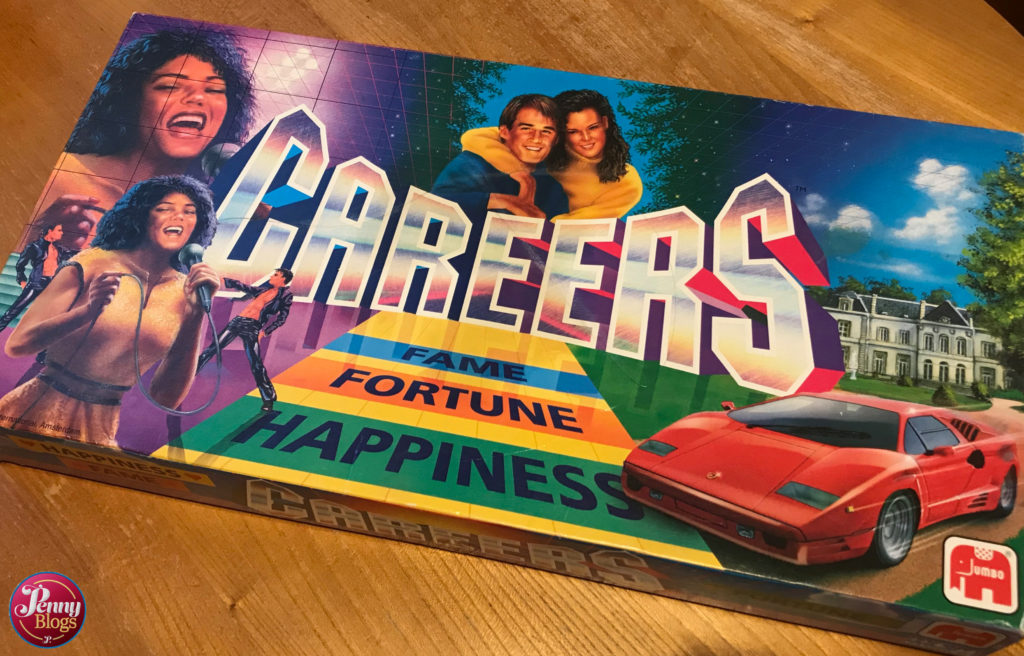
The game is a very close replica of the original Waddingtons game that I also own, but with the Uranium Prospecting replaced by Computing, Hollywood by Entertainment and going to Sea by going on a Yacht. Interestingly there are still 8 career paths on the board, not the six that I have read of there being in later versions. Being a European version of the game the salaries are also all in Euros rather than Pounds.
How to get your hands on Careers
If you’re looking for a copy of Careers then your best bet is to look on either *Amazon or eBay, as both regularly have copies available. As is usually the case, the copies on eBay are priced far more reasonably than those on Amazon… I guess I’m just surprised that no one else has re-issued this game more recently. With a couple of modernisations I can see it being really popular, or an exact replica of the original would also have great retro appeal too.
Are you a fan of vintage board games?
If you’re interested in vintage board games then why not head over to Facebook and join our new vintage board games group.
For more vintage board games and toys here on Penny Plays take a look here.
Disclaimer: This post contains an affiliate link for anyone who chooses to buy Careers on Amazon. This link is marked with a *. If you buy anything through this link I receive a small commission (thank you) and it costs you no more than it would do otherwise.

Leave a Reply